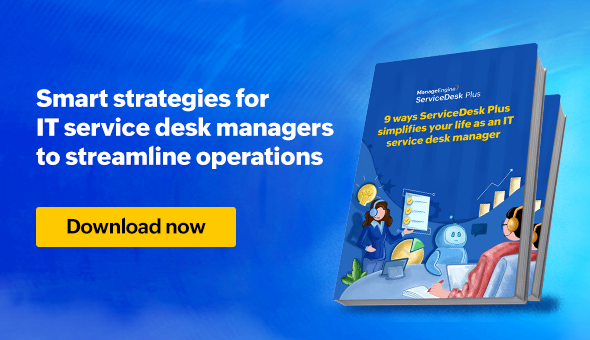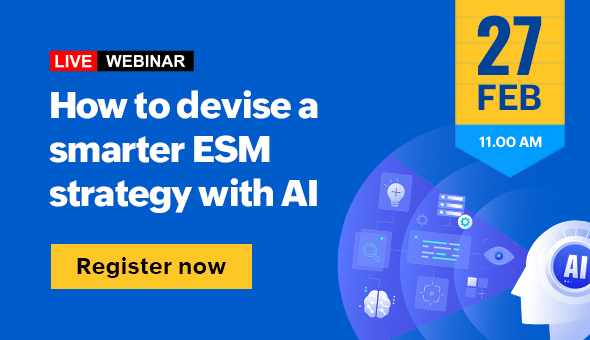Understanding agentic AI, AI agents, and their role in enterprise and IT service management
April 01 | 8 mins read
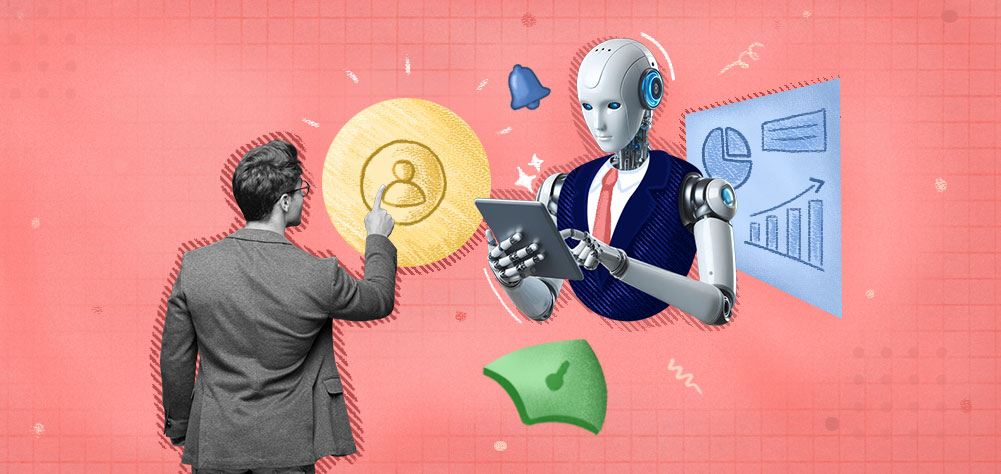
How AI agents can help us reimagine everyday
ITSM workflows and practices
The AI landscape is evolving at an unprecedented pace, and the progress we've seen so far has been nothing short of fascinating—especially in IT. What began as basic rule-based systems designed to perform routine tasks have now evolved into complex, autonomous agents that reason, adapt, and act independently—a testament to how far we've come.
Previously, virtual support agents were limited to executing repetitive tasks based on fixed rules, requiring human intervention at different touchpoints. In contrast, modern AI agents can be your digital skilled workforce that will dynamically adjust to changing conditions, act autonomously, and follow through without constant human supervision.
As AI agents take on more responsibility and autonomy, their role within business is becoming increasingly strategic. NVIDIA's CEO Jensen Huang, in his recent keynote speech at CES 2025, captured this perfectly when he said, "The IT department of every company is going to be the HR department of AI agents in the future."
For enterprises, the question is: How will these agents drive an autonomous approach to IT support? To get the answer, let's start with the basics.
From early rule-based chatbots to autonomous self-driving cars:
How did we get here?
What laid the groundwork to what we're seeing today is traditional AI. By analyzing data and following predefined rules, traditional AI does simple tasks and does them well—but these models are bound to the training data.
Then the spotlight shifted to the revolutionary generative AI. GenAI models surpass the limitations of traditional AI by learning and recognizing patterns in very large datasets and generating original content that goes beyond the training data to mimic human creativity.
Now has come a pivotal evolution—agentic AI. Beyond reactive interactions and constant human involvement, agentic AI takes a step further by acting autonomously, making decisions, and ultimately achieving goals.
Agentic AI: The next frontier in GenAI?
Think of agentic AI as AI on autopilot. These intelligent systems are designed to go beyond simply suggesting a solution to actually executing it.
The integration of automation technologies with GenAI enables these systems to learn, reason, and act to accomplish specific goals, execute multi-step processes, and automate diverse workflows—all autonomously.
For instance, imagine requesting a replacement for a faulty laptop. Today's virtual support agent could suggest suitable replacement models and provide steps to initiate the request, but it cannot autonomously place a new order or manage the delivery process.
However, this changes with agentic AI, which is able to take action to procure the asset.
Here's how it would work:
Perceive, reason, and decide: The agent gathers data by checking the warranty status, life cycle stage, and history of the device, scours through the asset inventory, and finds an available replacement laptop that meets company policies and employee requirements.
Act: Based on its understanding, if a new laptop needs to be procured, the agent can create a service request on behalf of the user, generate a purchase request, and communicate with vendors for order placement. It can stage gate the process by managing approvals, ensuring necessary authorization is obtained. It can manage logistics and communicate the tracking status, keeping the employee updated on their laptop’s arrival.
Learn and adapt: The agent will continuously learn and improve based on feedback and previous interactions to perform tasks faster and more efficiently.
More applications within the enterprise context
Traditionally, IT teams spend countless hours establishing and fine-tuning workflows to streamline service delivery and enhance productivity for both end users and technicians. From resolving technical issues to fulfilling employee requests, these workflows require constant manual intervention to ensure proper resolutions. Cut to the agentic era, we now have autonomous agents that can take on much of the load. Here are some use cases where AI agents can come in handy.
Collaborate across IT and other lines of business
Unlike traditional virtual agents and rule-based automations that operate in silos and require manual intervention at different touchpoints, multi-agent orchestration enables AI agents to work together to achieve a broader goal, ensuring end-to-end efficiency.
Take an employee onboarding request. Instead of relying on predefined workflows that demand human oversight at every step, the process can be triggered automatically—whether from an HRMS tool detecting a new hire, an email request, or a manager simply giving a simple prompt like: “Onboard a new employee.” Through intent matching, an onboarding agent can automatically trigger the onboarding workflow, routing approvals and notifying relevant teams.
From there, multiple AI agents across IT, HR, and facilities can collaborate in real time:
- The IT provisioning agent can take over user account setup, adding new employees to the right AD groups, creating email accounts, and ensuring access to necessary software.
- The people services agent can manage HR onboarding tasks, from scheduling induction sessions and drafting and sending meeting invites.
- The workspace setup agent can then handle desk allocation and update seating records.
By putting repetitive, cross-functional processes on autopilot, AI agents allow IT and other teams to focus on more strategic aspects of onboarding while ensuring a smoother experience for new employees.
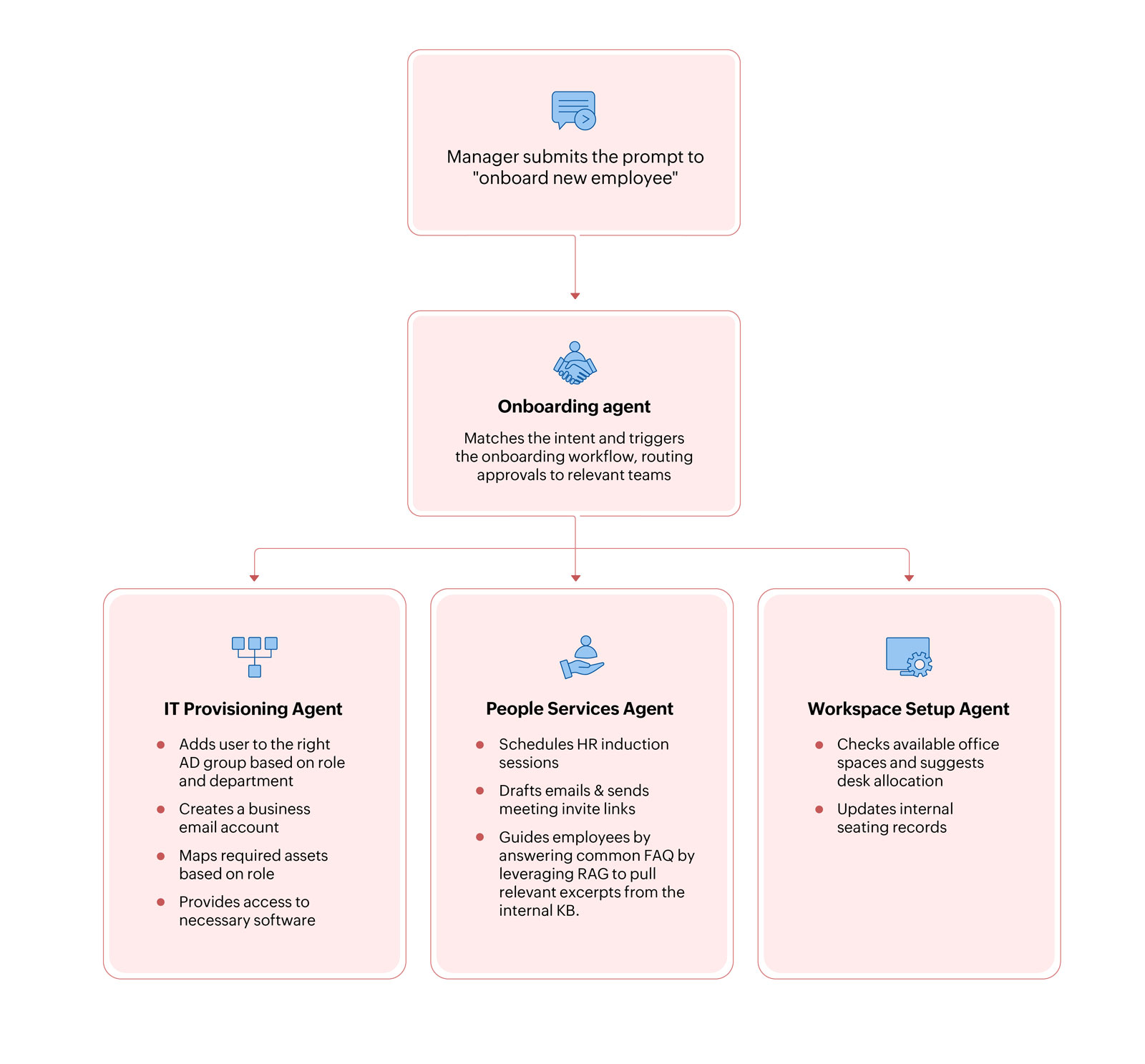
Turn passive problem detection into proactive self-healing
By excelling in interconnected environments and drawing data from other IT management apps like network monitoring solutions, AI agents can help site reliability engineers (SREs) stay ahead of potential issues.
Say, for example, the network monitoring agent detects high latency and fluctuating bandwidth in a specific router. Within the SRE lead’s dashboard, it can throw an alert in the chat interface, initiating a conversation saying: "I’ve detected that Router X is running outdated firmware. Based on performance trends, an upgrade is recommended. Would you like me to analyze potential risks and suggest a maintenance window?"
Once the SRE lead approves the suggested action plan, the IT support agent then carries out the following steps:
- Predicts downtime impact by assessing historical failure patterns, traffic loads, and peak usage times.
- Proposes an optimal upgrade and reboot schedule window during low-traffic periods, also ensuring alignment with existing maintenance windows.
- Communicates the planned firmware upgrade to relevant stakeholders.
- Generates a pre-upgrade checklist to streamline execution.
- Backs up the router's current configurations to prevent data loss in case of issues during the update, and then uploads the latest firmware.
- Rolls out the firmware upgrade process, ensuring necessary approvals are met.
- Finally, the agent generates post incident reviews (PIRs) and alerts relevant teams with a detailed incident report including diagnostics to prevent similar bottlenecks in the future.
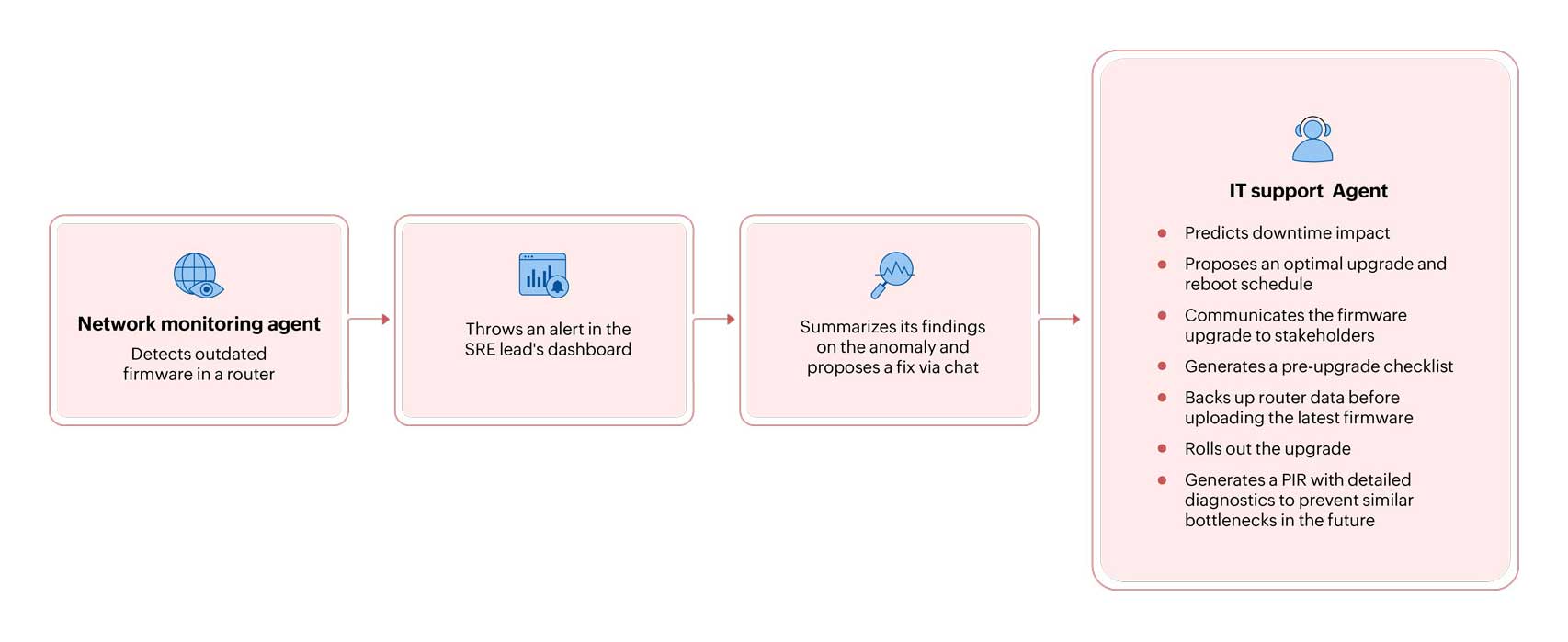
Drive AI-powered responses to security alerts
With the ability to operate around the clock and analyze vast datasets across multiple systems, AI agents can play a crucial role in handling security incidents, such as compromised passwords, by quickly identifying, assessing, and responding to potential threats.
Say the IT security agent in an SIEM solution detects multiple failed login attempts from suspicious access locations. The agent can flag this and create a security incident within the ITSM platform, summarize the detected risks, and assign it to the IT security team. It can then propose the subsequent remediation steps like temporarily suspending account access, forcing a password reset, and notifying the user about the potential compromise. Upon confirmation by the IT security team, the agent can automatically back up the user's critical files to a secure storage location and provide step-by-step guidance via chat for resetting the password securely.
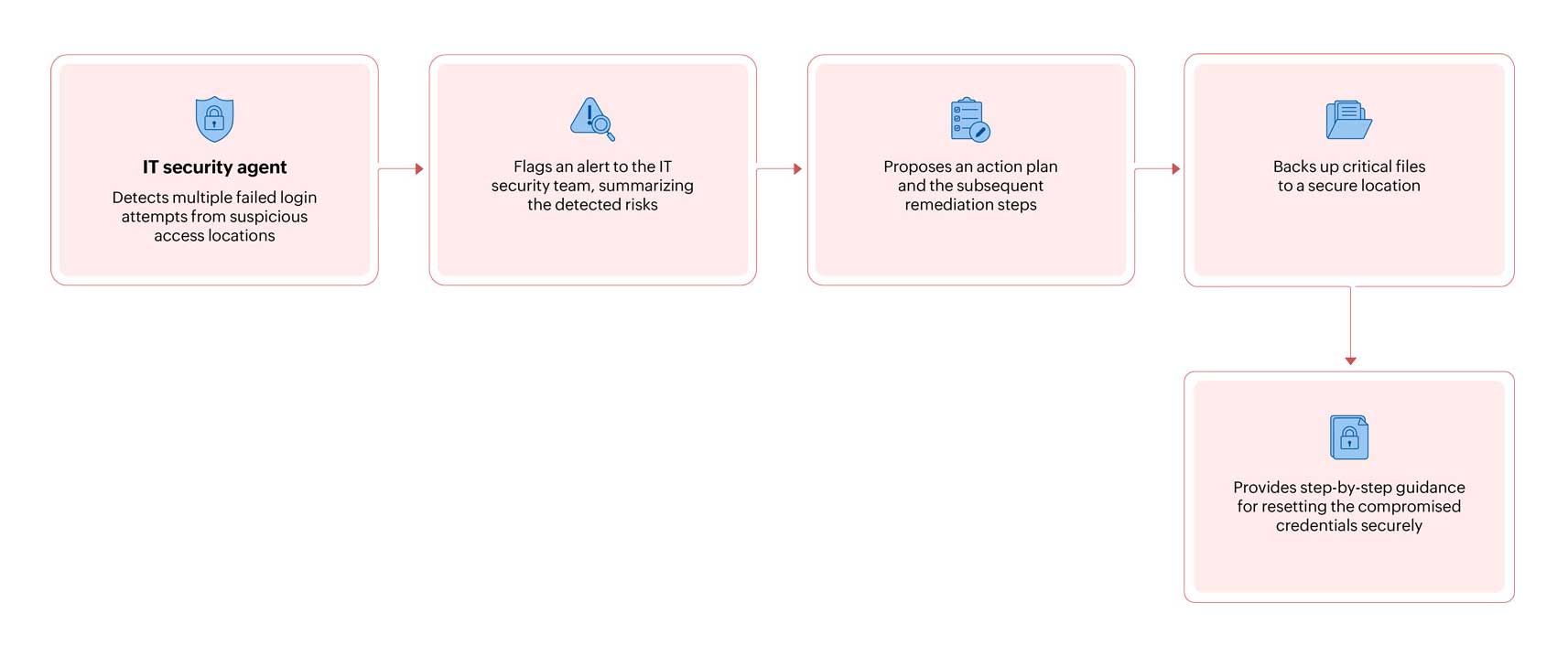
Are AI agents the future?
With the big players like OpenAI and Google making moves to enable agentic experiences with their own AI agents, it's only a matter of time before the market becomes saturated with multiple models to choose from. While these agents are the new kids on the AI block, as with all AI advancements, the technology comes with concerns. Business leaders will need to set clear boundaries on what agents can and cannot access and how much autonomy they should have.
The agentic era is indeed promising. Work-intensive disciplines like IT support, customer service, and software development will benefit. AI agents designed to handle routine and repetitive tasks will free employees to focus on more hands-on and creative aspects of their roles. Agentic AI should be seen as an enabler that augments human capabilities, fostering a positive relationship between technology and the workforce, driving productivity.



